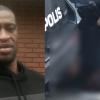Journalist Trevor Aaronson’s new podcast, Alphabet Boys, details the role Michael “Mickey” Windecker, an FBI informant, played in Denver’s racial justice protests during the summer of 2020. Following the murder of George Floyd by former Minneapolis Police Officer Derek Chauvin in May, 2020, protests erupted across the country, with local communities calling for greater oversight and reform of police departments. In Denver, protesters pointed to the case of Elijah McClain, and in Colorado Springs they pointed to the case of De’Von Bailey.
The protests in Denver and Colorado Springs included violent clashes with police, which has cost the Denver Police Department $14 million in subsequent excessive force lawsuits, while multiple lawsuits against the Colorado Springs Police Department have also been settled.
According to documents and undercover recordings obtained by Aaronson, Windecker, a convicted felon whose charges include sexual assault, began providing information to the Aurora and Denver Police Departments in June of 2020, before working directly with the FBI.
“Based on the internal FBI reports, it’s very clear that the FBI launched this investigation without any clear evidence that there was a violent plot,” says Aaronson in an interview with Colorado Times Recorder. “The records clearly show that the instigation for the investigation was First Amendment protected activity.”
Aaronson, whose book Terror Factory analyzed the FBI’s use of informants to target Muslim communities post-9/11, describes how the FBI is able to target domestic activists. “Pre-9/11, it would have been very hard for the FBI to launch an investigation without any kind of predicate, which basically means that they they have evidence to show that there is a crime being committed or there is violence about to take place, but in the post-9/11 era, the FBI was given this authority that became known as an assessment or sometimes called a ‘threat assessment,’” he says. “It basically allows the FBI to launch an investigation without a predicate, you know, just having very loose information.”
Alphabet Boys uses the FBI’s undercover recordings to show how the FBI used Windecker to target activists within Denver’s racial justice protest movement. “[Windecker] goes to the FBI and says, ‘You know, I know this guy, Zebb Hall, he’s saying things like, ‘I want to burn the motherfucker down. I want to be taught how to fight,'” explains Aaronson. “All these things that maybe they suggest some sort of questionable behavior, but nonetheless are protected by the First Amendment. The FBI basically uses that assessment power to say, ‘Okay, well, we’re going to sign up this Mickey Windecker as an informant, and he’s going to do an investigation, find out if this is true.’ The problem that that creates, of course, for someone like Mickey Windecker, is that once Mickey Windecker’s on essentially the payroll, he wants to keep getting paid.”
Payment receipts obtained by Aaronson show that Windecker was paid over $20,000 during the summer of 2020. The money expended on Windecker resulted in one conviction, after Windecker, a felon, convinced activist Zebb Hall to buy him a gun. Windecker was also involved in the events that led to activist Bryce Shelby to lose his firearms under Colorado’s red flag law after discussing plans to kill Colorado Attorney General Phil Weiser — who, recordings reveal, Shelby repeatedly confused with the Denver District Attorney.
“We’re really seeing here is kind of an evolution of these FBI counterterrorism tactics and and practices being used to target political activists,” says Aaronson. “In this case with obvious shades toward COINTELPRO and the FBI’s behavior in the 1960s.”
COINTELPRO was the FBI’s Counterintelligence Program, which was aimed at surveilling, infiltrating, discrediting, and disrupting domestic American political organizations that the FBI deemed “subversive,” including communists, feminists, Black Panthers, the American Indian Movement, among others.
Colorado has a long history of surveillance operations against political groups, going back to the 1960s.
According to Joan Jensen’s Army Surveillance in America, 1775-1980, “A military intelligence captain infiltrated Students for a Democratic Society (SDS) chapters at the University of Denver and at the University of Colorado. A sergeant who replaced this captain attended the SDS National Council meeting at Boulder in October 1968 with at least four other Army agents. In March 1969, this same sergeant threw a chair at S. I. Hayakawa [a conservative professor and later a California Senator] during a speech at the University of Colorado. When police arrested the agent and five other students, the Army arranged for his release and reassigned him elsewhere.”
According to the American Civil Liberties Union (ACLU), “On February 7, 2003, the Denver Police made public 1,500 pages of the so-called ‘Spy Files.’ More than 300 people jammed police headquarters, wondering whether they were the focus of police intelligence. Representatives of 70 groups also showed up. The document was the product of nearly five decades of intelligence-gathering and contained more than 3,200 people and 208 organizations.”
The ACLU also notes, “Another released document showed that Denver intelligence officers spied on the participants of a conference by collecting the license plate numbers of their vehicles in the parking lot, and then listed their corresponding names and home addresses in the Spy Files. At yet another instance, the Colorado Springs Police Department supplied the information of 80 participants of a peaceful demonstration, along with the license plate numbers of 30 of them, to the Denver intelligence Bureau. James Wattles, a Denver Intelligence officer subsequently produced a document that listed the corresponding names and addresses of the 30 participants. The ACLU of Colorado also obtained documents that indicate that the FBI’s Joint Terrorist Task Force (JTTF) has been gathering information and creating files on the activities of peaceful protesters who have no connection to terrorism or any other criminal activity.”

Alphabet Boys also details how Windecker’s work as an informant in Denver led to a JTTF investigation of activists in Colorado Springs. “JTTFs are basically this partnership between local law enforcement and the feds,” explains Aaronson. “It was initially created to allow for the sharing of information and intelligence to thwart would-be terrorists in the United States. Since that time, it’s evolved into a larger partnership that has ended up targeting, like in Colorado Springs, the activist community there.”
The use of a CSPD undercover officer, working with the FBI’s JTTF, was exposed after the arrest of protesters during a July 2021 protest march in Colorado Springs. Alphabet Boys shows how the outlandish, anti-communist fervor of right-wing media colored the arrest warrant affidavits of one of the activists, which noted how the red flags of the protesters were “a radical political symbol, and designates the march as revolutionary and radical in nature.”
The JTTF essentially deputizes local police as federal agents, which Aaronson says leads to arrest warrant affidavits that read like an episode of InfoWars. “The FBI ends up opening itself up to problems where these local cops kind of get above their heads and they investigate things that they really have no business or training to investigate,” he says. “I think that’s where you begin to see a lot of this kind of media propaganda bleed through into law enforcement.”
Alphabet Boys also details how the CSPD undercover officer attempted to coerce activists into selling her illegal guns, and offered to sell activists grenades.
“They physically walk this person down the line towards some sort of terrorism plot,” says Aaronson. “A plot that never would have been possible on their own, but the FBI provides everything — money, the idea, the fake bomb. Then when they get the person to press the button expecting the bomb to blow up, they arrest him and charge him with material support or conspiring to use a weapon of mass destruction. Then they announce to the public, ‘Hey, there’s been this terror plot foiled.’”
These tactics have not just been used against the left in Colorado. In February, 2021, Richard Holzer was sentenced to 19 years in federal prison for his role in a plot to blow up a Pueblo Synagogue. Holzer, a neo-Nazi whose defense team argued he suffered impairment from fetal alcohol syndrome, conspired with FBI agents on the bomb plot. According to court documents, an FBI agent reached out to Holzer on Facebook posing as a woman with white supremacist leanings. This eventually led to an in-person meeting at a Colorado Springs restaurant between Holzer, a friend of Holzer’s, and three undercover agents.
Investigations into the Jan. 6 insurrection have also revealed the prevalence of FBI informants in the midst of groups like the Proud Boys and the Oathkeepers, but Aaronson notes that, while the FBI does target some right-wing groups, it predominantly goes after those on the left.
“The number of cases that target right-wing activists, I would argue, is a minority compared to the number of cases that target left-wing activists and particularly the target Islamist extremists,” says Aaronson. “This type of abuse happens across the political spectrum. I think what we really need is a very holistic look at the FBI, and who they’re investigating, and the tactics they’re using in these types of things in order to kind of come to the reform that I think this country really needs the FBI to go through. At the same time, I think if you had access to the internal files of the FBI, I believe what they would show is that while they do target right-wing groups and right-wing extremists, they are targeting left-wing groups at a much greater clip than they are right-wing groups.”




